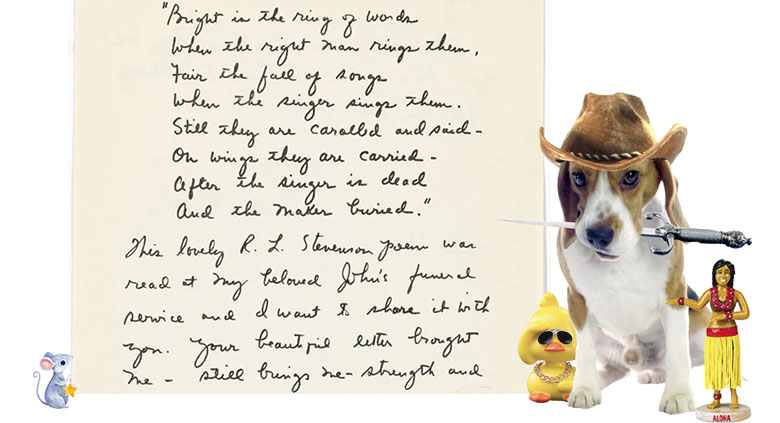John Steinbeck wrote a letter to Carlton Sheffield about a conversation he’d had with his wife, Elaine.
“Once I said to her, ‘I don’t want the barbarity of funeral for myself.’ And she said, ‘Don’t be silly. A funeral isn’t for the dead. You’ll simply be a stage set for a kind of festival, maybe. And besides, you won’t even be there.'”
– Steinbeck: A Life in Letters, p 829
Henry Fonda – one of the most famous actors of his generation – stood up at John Steinbeck’s funeral and recited a piece of a poem by Robert Louis Stevenson:
Bright is the ring of words
When the right man rings them,
Fair the fall of songs
When the singer sings them.
Still they are carolled and said
– On wings they are carried –
After the singer is dead
And the maker is buried.
– Robert Louis Stevenson
We know Henry Fonda spoke those words because Elaine Steinbeck, John’s wife, describes the scene in a letter to her friend, Jean Vounder-Davis.
What will people say when you are gone? Will memories of you ring like bells in the hearts you left behind?
How will you be remembered?
You cannot build a reputation on what you intend to do.
The saddest eulogy ever carved on a tombstone said, “He Had Potential.”
Will you be remembered for having a lot of money?
“You can have money stacked to the ceiling, but the size of your funeral will still depend on the weather.” – Chuck Tanner
Will you be remembered as a selfish person, or a generous one?
“We make a living by what we get. We make a life by what we give.” – Winston Churchill
I have never seen a hearse pulling a U-Haul trainer.
“We brought nothing into this world, and it is certain we can carry nothing out.” – Paul’s letter to Timothy, ch. 6
Will you be remembered as a critical person, or as an encourager?
“People will forget what you said, people will forget what you did, but people will never forget how you made them feel.” – Maya Angelou
There is nothing standing in the way of you being a different person today than you were yesterday. Do you remember what I wrote to you in last week’s Monday Morning Memo?
“Escaping the past is easy. The hard part is choosing to start over.”
If we make the right decision, we’ll have more to be thankful for next Thanksgiving than we did this year.
Ciao for Niao,
Roy H. Williams
 Douglas Katz is a West Point graduate, a disabled Army veteran, and a culinary enthusiast (also known as a foodie.) Douglas, like many other people who suffer from limited mobility, struggled to use kitchen utensils that require upper extremity strength. Aided by an army of friends and military veterans, Doug retreated to his workshop to invent a new type of kitchen knife, the first in a series of “adaptive” kitchen products he plans to introduce. Doug is building a cutting-edge company (pun intended) dedicated to radical innovation and inclusive kitchen design. It’s happening and it’s happening right now, with roving reporter Rotbart and you at MondayMorningRadio.com.
Douglas Katz is a West Point graduate, a disabled Army veteran, and a culinary enthusiast (also known as a foodie.) Douglas, like many other people who suffer from limited mobility, struggled to use kitchen utensils that require upper extremity strength. Aided by an army of friends and military veterans, Doug retreated to his workshop to invent a new type of kitchen knife, the first in a series of “adaptive” kitchen products he plans to introduce. Doug is building a cutting-edge company (pun intended) dedicated to radical innovation and inclusive kitchen design. It’s happening and it’s happening right now, with roving reporter Rotbart and you at MondayMorningRadio.com.
